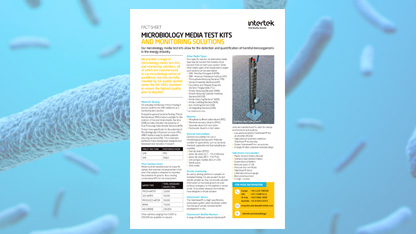Intertek helps clients detect and treat costly fuel system problems resulting from microbial infestations.
Microorganisms can thrive in fuel tanks when given the right conditions. Subsequently, microbial growth leads to increased solids through fungal and yeast biomass, production of slimy biopolymers and increased production of corrosive sulphides via sulphate-reducing bacterial growth, among other issues. Overall, this leads to fuel quality degradation, fuel system corrosion, plugged filters, corroded fuel injectors and fuel starvation.
Undetected and untreated bacterial and fungal problems affect fuel and fuel-systems for diesel, biofuels, jet fuel, and other fuels. The problem can be local to the microbial infestation, separated by short distances in the distribution system, or even located miles away in the supply-chain.
It is important to identify the location of microbiological activity resulting in a particular problem and find the root cause of the microbiological activity. Removal and prevention of bacterial growth in fuel tanks and systems often requires the removal of water from the tank, filtration and/or treatment of the tank with biocide additives.
Intertek can help both locate, identify (microbial testing), and treat microbial infestations in diesel fuel systems. Intertek provides a range of microbiological testing services and kits (microbiology test kits) to help clients determine the nature of any microbial "bug" infestation of fuel, helping determine what course of action to take.
Diesel fuel microbe infestation analysis, IP-385 and IP-472:
- Bacteria, Yeast, Mould
- Fungal Fragment Count
- Moisture Content
- Clear and Bright Fuel Evaluation
- Sulphate-reducing bacteria, heterotrophic bacteria, hydrocarbon-degrading bacteria.
Microbiological growth and related problems with diesel fuel:
- Bacteria:
SRB causes Corrosion, GHB causes Biofilm Development, Pseudomonas causes Surfactancy Problems, alongside Flavobacterium, Acinetobacter and Micrococcus. - Yeasts:
Candida, Saccharomyces, Torula, Hansenula result in fuel degradation. - Moulds:
Hormoconis resinae (formerly Cladosporium Resinae), Aspergillus (both form bacterial mats, below which intense corrosion can occur), Penicillium, Fusarium and Botrytis cause a range of issues.
Diesel microbial contamination symptoms:
- Aggregation of Biomass observed as Discolouration, Turbidity and Fouling
- Biosurfactants promote Stable Water Haze and Particle Dispersion affecting Plug Filters, Pumps and Injectors
- Tank Pitting through corrosion mechanisms
- Non-uniform Fuel Flow and Variations in Combustion may accelerate Piston Rings and Cylinder Wear Rates and affect Camshaft Torque
Intertek has researched the visual evidence of damaging bacteria growth in fuel tanks. The findings originate from a client fuel condition monitoring program. Intertek offers fuel condition monitoring services to help clients protect their fuel inventories and fuel-systems from microbes.

